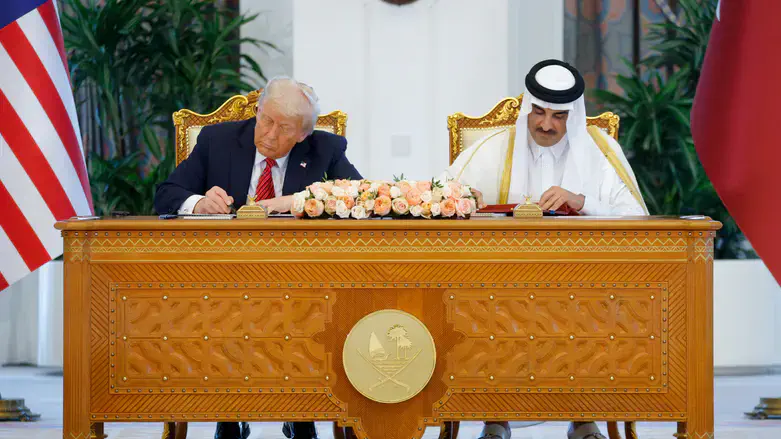
President Donald Trump wants to turn enemies into friends the Abraham Lincoln way: “With malice toward none, with charity for all … to achieve and cherish a just and lasting peace among ourselves and with all nations." It is indeed a noble aspiration even if it is not very likely to work with today’s bad guys--and it got Old Abe shot.
Behind the Saudi Air Force escort and the glamorous mounted cavalry that welcomed the American president’s arrival, and the smiles and handshakes and upbeat speeches, was the omnipresent Quran, exhorting the faithful to “fight those who do not believe in Allah, who do not embrace the religion of truth, willingly submitting and fully humbled.”
The obligation to fight and humble infidels is most deeply entrenched on the Arabian peninsula that gave birth in Mecca to the founder of Islam.
It is not unwarranted then to wonder about the authenticity of the Arab leaders’ exuberant handshakes with President Donald J. Trump as he visited the Crown Prince of Saudi Arabia, then the Emir of Qatar, and the ruling Sheikhs of the UAE.
Or about the new Syrian president’s true feelings, whose mortal sins in al Qaeda and al Nusra were instantly absolved—along with the $10-million U.S. bounty on his head—by a handshake.
Another Quranic injunction is that Muslims will “have no relationship left with Allah” if they become friends with infidels—unless they are merely “acting” friendly to temporarily protect themselves from a stronger opponent, in which case “deceptions” are highly laudable and encouraged.
When the U.S. president stepped briskly from his plane into that boiling landscape with its underlying perils, it was the same Donald Trump who placed his hand familiarly on the arm of the world’s most provocative outlaw, Kim Jong Un, and declared how honored he was to meet him, and then invited himself to walk with the Supreme Leader inside North Korea.
Now the American Daniel fearlessly entered a den of desert lions, taming them (temporarily, at least) with the same gushing praises and wide-open arms. He knew where he was and the kind of men he was lauding and embracing—and most people realized that the layers of compliments cloaked a muscular diplomacy.
It could backfire, though.
Trump’s brusque handling of Ukraine’s President Zelensky contrasted sharply with the way he wooed Russia’s President Putin for a truce. That unleashed a barrage from the mainstream media of comparisons with Neville Chamberlain’s infatuation with Adolf Hitler and Chamberlain’s belief in Nazi promises.
Trump’s unreserved embrace of the royal dictators in the Middle East, who devoutly follow the Quran’s teachings and whose countries are ruled by Sharia law, and his enthusiastic pardon for the supposedly reformed terrorist ruling from Damascus, brought similar claims from the media of abandoning Israel and caused a great deal of consternation among Trump’s conservative base.
But unlike the timorous Chamberlain, and in line with the pre-magnanimous Abraham Lincoln who crushed the Confederate army, Donald Trump moved immediately in his first presidency to clamp down on warmongers. He hobbled Iran’s economy, wiped out the savage ISIS army and ordered the assassination of the commander of Iran’s Quds Force. And he did this while side-lining the Palestinian Arabs, moving the U.S. Embassy to Jerusalem, accepting Israel’s claims to the Golan Heights, Judea, and Samaria—and forging the Abraham Accords, the best peace so far brought to that region.
On his first day in Saudi Arabia, at a major investment conference, the highly pragmatic president described his Iranian policy.
“I’m here to offer Iran a new path and hopeful future, to end past conflicts and forge new partnerships--to make the region and world a safer place. But if they reject this olive branch and continue to attack their neighbors, we will have no choice but to inflict massive maximum pressure and drive Iranian oil exports to zero—like I did before. And I will stop the regime from ever having a nuclear weapon. The choice is theirs to make.”
Everyone at the conference, including Crown Prince Mohammed bin Salman, understood they were being given the same choice. If their handshakes with Donald Trump proved deceitful, the good cheer and largesse being spread on the Arabian peninsula and in Syria would devolve into “massive maximum pressure” that paralyzed their economies.
When Neville Chamberlain was in office, the disturbers of the world’s peace were not from the Middle East but from Germany. The German justice inspector, Friedrich Kellner, who kept a diary to record Nazi crimes, wrote of the British prime minister:
“England allowed itself to be stupefied under the leadership of a contemptible and senile old man. I will not reproach Neville Chamberlain for espousing peace, but he should have been a parson in a small village, not the foremost statesman of a world power. He had the duty and obligation to ensure any attack would be immediately countered.”
No one thinks of the global Donald Trump as a parson in a small village. But if ever he were in a village, the intrepid and enterprising Donald Trump would immediately secure two roles for himself: seated behind the mayor’s desk, he would be signing executive orders while prominently wearing a large solid gold sheriff’s badge pinned to his chest.
Prof. (ret.) Robert Scott Kellner, a U.S. Navy veteran, was stationed in Ras Tanura, Saudi Arabia, in 1960-61, where part of his responsibilities was to lead the evacuation of American and other foreign oil workers onto ships in the Persian Gulf in case of a terrorist attack. A retired English professor, Kellner taught at the University of Massachusetts and Texas A&M University. The grandson of Friedrich Kellner, he published the diary in its original language in Germany in 2011 and is the editor and translator of the English edition, My Opposition: The Diary of Friedrich Kellner--A German against the Third Reich, Cambridge University Press, United Kingdom, 2020.